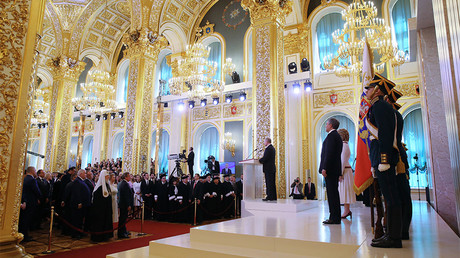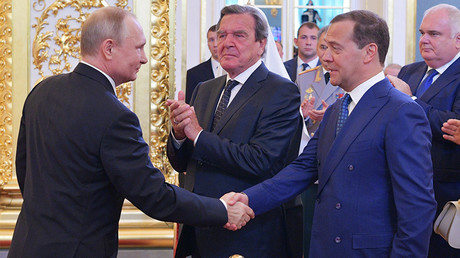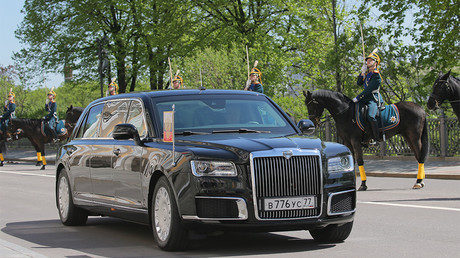Keeping Russia great: Putin's final presidential term will be his most difficult
Bryan MacDonald is an Irish journalist based in Russia.

When Putin first became president in 2000, he inherited a basket case. Since then, he has restored much of Russia's former greatness. Now he faces his toughest challenge: ensuring those gains are consolidated after his departure.
Since his first presidential election victory, there have been three Putin epochs. And to partially borrow from Donald Trump's successful US election pitch, they have been: 'make Russia stable again' (2000-03), 'make Russia rich' (2004-07), and 'make Russia respected again' (2012-17).
Now, in his presumed final term, Putin has to achieve something which eluded long-serving Kremlin bosses in the 20th century. And that is to manage a successful transition. Because, in the Soviet era, Josef Stalin (28 years in power) and Leonid Brezhnev (18 years) both failed to plan for the future. With the former leaving behind a vicious power struggle and the latter's mismanagement creating the conditions for the complete collapse of the state, less than a decade after his own demise.
Of course, the USSR was a multi-national superpower (incidentally, Stalin was Georgian and Brezhnev Ukrainian) but running the slimmed-down Russian Federation is no cakewalk either. The system remains unwieldy, with many outdated practices stunting growth and an overgrown bureaucracy which stifles innovation. Not to mention a culture of dependency and a legal system crying out for an overhaul, with very few court acquittals and often poor implementation of property rights.
New Blood
The good news is that, unlike his erstwhile predecessors, who both died in office, Putin appears to be acutely aware of his responsibilities. Indeed, in March he replied to a question about whether he'd try to secure a fifth term by saying: "What, am I going to sit here until I'm 100 years old? No." At the same time, recent personnel changes suggest the president is grooming a cohort of young officials to take over the reins. The rapid rise of the economic development minister, Maxim Oreshkin, 35, being a case in point.
Oreshkin and his peers have a very different worldview from those who've gone before. They've grown up watching American television, using the internet, and traveling. This contrasts with their elders who generally maintain a very Soviet way of thinking, and were educated to succeed in structures which no longer exist. However, this doesn't mean the coming Russian generation are westernizers. Many Russians, and it often seems particularly the youth, fear their country being subsumed into the US-led order and they utterly reject the über-liberal values of the European Union.
Nevertheless, you sense the majority would like to see current tensions dialed down in order to boost economic growth. Because, after an unprecedented boom during Putin's first two terms, Russia's fiscal position, in common with most of Europe, hasn't improved much since the 2008 'Great Financial Crash.' And, post-2014, living standards have fallen.
On the other hand, Putin's foreign policy has been wildly popular. Especially the reabsorption of Crimea in 2014 and the fact he's perceived to have finally held back a NATO tide which moved closer and closer to Russia's borders since the 90s. All this led to a strange mood during the election campaign where young people often pointed out how they were disappointed in the government's management of domestic affairs but proud of the president's external maneuvers.
The Next Steps
Putin has professed himself to be acutely aware of this deficit and has been telling Russians to "look at the future strategically," which amounts to calling for a collective effort to get Russia on the right track. And he's also been speaking of the need for the country to make a significant technological breakthrough, in order to kick start the economy. Some experts seem to believe this might come from a discovery in the area of blockchain or another IT bonanza. While others reckon the Kremlin needs to get the simple things right first: crackdown further on corruption, overhaul manufacturing, and double down on agricultural development.
To achieve his targets, Putin is going to need the correct personnel. And the rumor mill has been in overdrive for the past few weeks. So, rather than regurgitate various theories, I am simply going to give my own view on the likely composition of the next government.
Following the president's inauguration today (Monday), the cabinet must resign and a new one be installed within a fortnight. Putin will also issue decrees setting out the policy priorities for the term.
First up, Putin has already announced that Dmitry Medvedev will remain as prime minister. But that doesn't mean he'll last the full term, because there are a few options at the president's disposal. For instance, he could replace him with a likely presidential successor in 2021 or 2022. Or he might keep Medvedev in place for the entire six years and allow him a second shot at the presidency in 2024.
If I had to make a call, I'd plump for Medvedev to be given reduced powers, and for someone like Tula Governor Alexey Dyumin, 45, or Oreshkin to be installed in a few years' time. In fact, I think Putin will play it safe until at least 2021, before launching a radical overhaul.
Blast from Past
Some of Medvedev's responsibilities could be taken on by Alexei Kudrin. The latter was an acclaimed finance minister in the 00s, but he fell out with Putin over increases in military spending. Many well-placed sources suggest he will be made the presidential aide for international economic affairs, primarily focused on mending Russian-EU relations. While Kudrin is well regarded in the West, that will be a tough task without a simultaneous dialing-down of military and diplomatic tensions.
Other headaches for Putin are the status of Defense Minister Sergey Shoigu, 62, and Foreign Minister Sergey Lavrov, 68. Because, while their age profiles aren't favorable, they have both been seen as successful in their positions. If Lavrov does retire, Sergey Ryabkov – an excellent English speaker and his deputy since 2008 – would be the obvious choice, but there has been speculation about current Press Secretary Dmitry Peskov taking the post, which I personally find implausible.
Meanwhile, should Shoigu step aside, the aforementioned Dyumin is a likely candidate to take over. And such a move would serve to confirm his rumored status as Putin's favored successor. This assumes, of course, that the present hyper-presidential system (introduced by Boris Yeltsin in 1993, with Bill Clinton's support) is maintained.
History shows how very few long-serving European leaders have pulled off the trick of a smooth transition of power. And, of these, Charles DeGaulle, Francisco Franco, Konrad Adenauer, and Antonio Salazar were either close to death or very elderly when standing down. By contrast, Putin, although 65, is a fit and active man, who will be the same age as Trump is right now, when forced to leave office in 2024.
All this means the next six years will arguably be the most challenging of Putin's time at the forefront of Russian politics. He has managed to make Russia stable again and he restored its status on the world stage. Furthermore, his leadership has seen Russians enjoy greater prosperity than at any time in the country's history. But now he needs to ensure his achievements last and that he's remembered as a DeGaulle rather than as a Brezhnev.
The statements, views and opinions expressed in this column are solely those of the author and do not necessarily represent those of RT




0 Comments:
Post a Comment
Subscribe to Post Comments [Atom]
<< Home